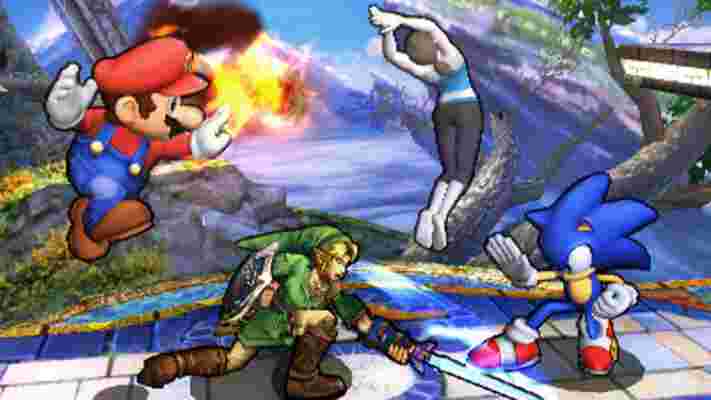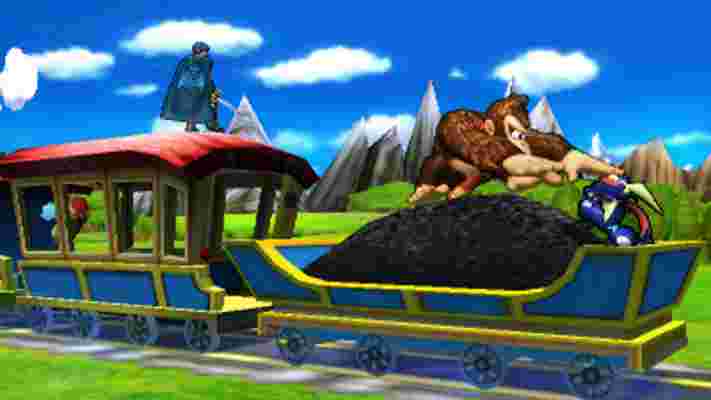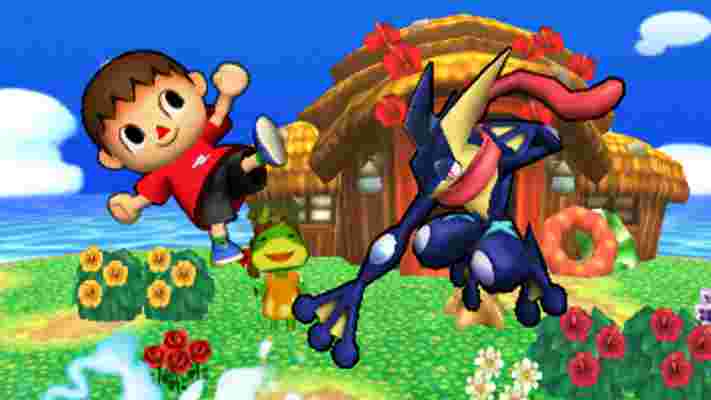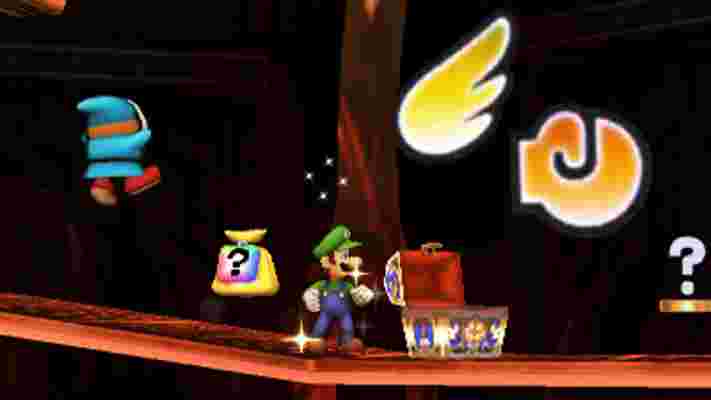There's never been a greater Nintendo love letter than the Super Smash Bros series. From the ever-increasing roster of characters covering every last nook and cranny of the Ninty (and occasionally non-Ninty)-universe to the endless number of nerdy items, stages and trophies, each iteration of this all-star fighting game has shown just how rich Nintendo's history has been and how vibrant it continues to become.
That is, at least on the home console side of things. While the N64, GameCube and Wii versions of Smash Bros have all been iconic snapshots of their respective eras, it's arguable that none of them have really celebrated the 'other' half of Nintendo's legacy – its handhelds – to quite the same extent. This changes with Super Smash Bros for Nintendo 3DS. Not only is it the first ever Smash Bros to grace one of Nintendo's portable consoles – which is a feat in and of itself – but it's also a fantastic tribute to both the 3DS and Nintendo's handheld past.

^ Banish those commuting blues with a quick round of Smash on the train
The proof is in the brand new set of 3DS exclusive stages, all of which now have their own dedicated Final Destination (aka: completely flat) form to give competitive players a bit more variety in their choice of arena. For instance, one of Kirby's new stages, Dream Land, takes place inside an original Game Boy, complete with a yellow dot-matrix background. It's a similar idea to Melee's unlockable Mr Game & Watch stage, Flat Zone, but like several other arenas in Smash Bros 3DS, Dream Land's landscape isn't just a static set of platforms. Along with the new Rainbow Road, Fire Emblem's Arena Ferox, Kid Icarus Uprising's Reset Bomb Forest and the returning Mushroomy Kingdom to name just a few, Dream Land is constantly on the move as it travels through different scenes and stages from the game, offering an ever-changing play space to get to grips with.
Likewise, 3D Land, which riffs off Super Mario 3D Land for 3DS, is one of the most inventive stages yet, with its combination of side-scrolling camera pans and 3D obstacles that gently alter the arena as they move toward the screen. They even start destroying it at one point, showing that the environment can be just as lethal as your opponents if you let your guard down. Your surroundings aren't always quite so dangerous, though, as New Super Mario Bros. 2's Golden Plains actually rewards you with strength boosts if you collect over 100 gold coins.

^ You'll need to watch out for that rear carriage when playing on the Spirit Train, as it's prone to going offscreen at any moment
Another firm favourite is the Spirit Train from The Legend of Zelda: Spirit Tracks on the Nintendo DS. Taking place on the back of Link's very own locomotive (or Alfonzo's if Link or Toon Link happen to be fighting), other exploding trains will approach from behind while the very rear carriage will periodically change form as the train grinds to a halt, meaning anyone left on the right hand side of the screen will be perilously close to being launched into oblivion if they take a nasty hit offscreen. Likewise, anyone who gets pushed onto the tracks will be whisked away faster than they can blink.
With so many visual treats and constantly shifting landscapes to take in, it makes older stages such as the returning N64 classic Brinstar (with its rising lava levels and narrow platforms) seem positively quaint by comparison. We love a bit of variety, though, and these calmer stages help provide a much-needed break from their more chaotic counterparts.

^ Greninja is one of the newest Pokemon entries, joining Pikachu, Lucario and Charizard as playable characters
Of course, shrinking Smash Bros down to a tiny handheld screen doesn't quite deliver the same impact as playing it on the TV, but it's hard to complain when you're presented with such a beautifully smooth 60fps of high octane action. Admittedly, it can get a little difficult to see what's going on when the camera is fully zoomed out, but luckily there's an option to increase the size of each character's cell-shaded outline so they don't get lost in the fray.
One of the biggest new additions to the 3DS version of Smash Bros is Smash Run. This involves a five minute sprint through a massive, almost Subspace Emissary-style map, grabbing as many stat upgrades as you can pummel out of various Nintendo enemies. You can improve your attack power, special attack power, defence, speed, jump and arm strength, and the fruits of your endeavours will then be carried over to the ensuing battle, either against AI characters or up to three friends over local wireless.

^ As well as stat boosts, you'll also find a variety of other items in Smash Run, including trophies, special moves and piece of equipment
Five minutes is a little long for our liking, but at least the map's huge size means you'll rarely be doubling back on yourself. There are plenty of hidden secrets to be found here, too, including classic Smash the Target rooms which reward you with extra power ups if you complete the challenge in time, as well as special moves and pieces of equipment to use elsewhere in the game.
This is one of the major departures from older versions of Smash Bros, as you can now customise every single character to your liking, including your own Mii. In Smash Run, you can change their equipment, special moves and individual powers. The latter are only available during the main Smash Run, offering brief stat boosts or automatically equipping you with certain items for example, but equipment and special moves are more permanent additions that can be used in ordinary Smash battles, online, and in Classic and All-Star modes as well.
^ Enemies from StreetPass Quest also make an appearance in Smash Bros, causing havoc on unsuspecting fighters
Equipment falls into three main badge categories: attack, defence and speed. You can only attack three badges in total, but it's surprising just how much you can alter the overall balance of your character. This can lead to some truly game-changing results in the process, which in turn brings a new sense of challenge to every match you play. For instance, bulky heavyweights such as Bowser and Donkey Kong can suddenly turn into lightning fast sprinters by applying three speed badges, but their attack power will be severely diminished as a result.
Special Moves, on the other hand, change your character's physical move set, adding even more surprises for potential opponents. Most are slightly different variations on their default repertoire, so they're never drastically different from what you're expecting, but it nevertheless adds a brand new level of depth to Smash's gameplay that really lets you play to your strengths regardless of skill level. If anything, it helps level the playing field for less experienced players, and it gives Smash a much more personal touch to make victory feel that much sweeter.
All this isn't available from the word go, though, as you'll have to work hard to earn those moves and equipment badges by playing through both Smash Run and the game's All-Star and Classic modes. You can also unlock different outfits for your Mii, too, and customise their move set in much the same way as the rest of the game's roster.
^ You'll be fighting tooth and claw to get your hands on that Smash Ball when it appears
Speaking of which, there are now more playable characters than ever before, with the roster stretching to a massive 49 in total. Part of this is due to hardware limitations on the 3DS itself, meaning that Zelda and Sheik and Samus and Zero Suit Samus are now their own distinct characters rather than two melded into one, but on top of all the returning characters from Brawl on the Wii, Smash Bros for 3DS sees 15 new entries join its ranks, all of which add a huge amount of variety to the game.
We'd be loathe to spoil too many of them, but the attention to detail is simply mind-boggling. The Wii Fit Trainer, for instance, has one of the most bonkers move sets we've ever seen, from her face-crunching stretches to her hula-hoop recoveries and random pieces of fitness advice, but the game's presentation fits each character perfectly. The same goes for Animal Crossing's Villager and their ability to grab, quite literally, anything out of mid-air and stash it in their pocket to use again later for their nefarious purposes.
^ Classic mode borrows the same risk and reward structure found in Kid Icarus Uprising
Older characters have also been tweaked and rebalanced as well. This may disappoint more hardcore players, but we say it makes learning to use them again that much more fun. While some may argue that the 3DS's Circle Pad is a poor man's GameCube stick, we certainly had no trouble at all getting to grips with the game's simple controls and we were knocking out Smash attacks, special moves and lobbing our opponents off the edge of the arena in no time at all.
There are several ways to play, too. Single matches are perfect to dip in and out off when you have a spare moment, but you can also play through longer, continuous bouts in the new Classic mode. Borrowing the same risk and reward system from Kid Icarus Uprising, you can now alter the difficulty using a sliding scale from 0.0 to 9.0, with higher intensities giving you better rewards and more cash if you manage to make it out alive. The only downside is that you'll have to fork out a higher penalty if you lose all your lives, as well as some of your hard-won upgrades. We're big fans of this more incremental approach to Classic's difficulty mode, though, as it not only gives you a greater sense of challenge and progression, but it also makes it more approachable for newcomers.
^ Nintendogs graduate from being a stage-hogging Assist Trophy to having their own stage, complete with falling toys from the sky
All-Star mode has been given a slight makeover, too, as enemies are now grouped together in chronological order, creating an impromptu Nintendo history lesson as you make your way to present day. It's a nice touch, but it can make subsequent playthroughs feel a repetitive, particularly when you consider Classic mode has branching pathways that each contain their own distinct challenges and difficulty levels (in addition to the set difficulty scale you choose at the beginning). It's a small complaint overall, though, and one that hardly detracts from our overall enjoyment of the game.
Throw in all the familiar multi-man smash modes, the ever-faithful home-run contest, a truly exceptional soundtrack and a surprisingly substantial StreetPass mode, and Super Smash Bros for Nintendo 3DS is by far one of the greatest versions of the game yet. Once the servers have filled up with local players, we'll also update this review with our experience of the game's online multiplayer.
However, releasing this 3DS title just weeks before the Wii U version (still currently dated "Holiday 2014", according to Nintendo) looks a little calculated to us, baiting loyal fans into buying both copies of the game when a simultaneous release could have undoubtedly been possible after the initial delay on the 3DS version. Thankfully there's plenty here to give the 3DS version its own unique feel and identity - the Wii U version, for instance, will feature more customisation options, more music and completely different stages - plus the idea of finally having Smash Bros on tap in your pocket is just too good to resist. It wins a Best Buy award, but Wii U owners may want to wait a few weeks and make a more measured decision once both versions have been released.
| Availability | |
|---|---|
| Available formats | Nintendo 3DS |
| System Requirements | |
| Price including VAT | £33 |
| Supplier | www.zavvi.com |
| Details | www.nintendo.co.uk |
| Product code | N/A |
| Hard disk space | 1.4GB (10,975 blocks) |
